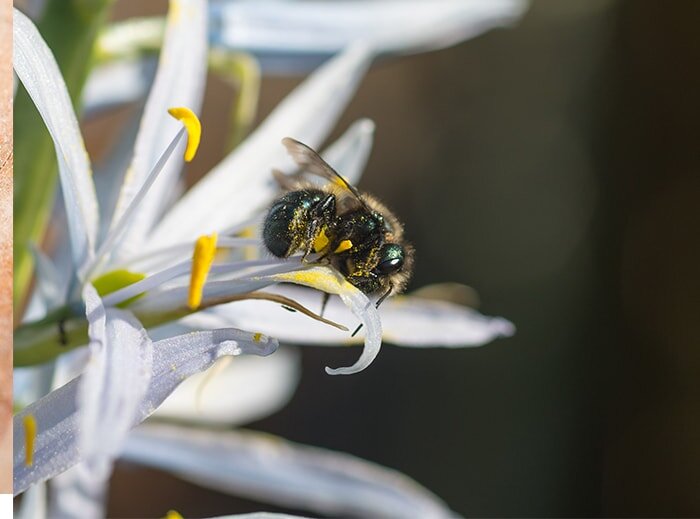Did you know that bees are responsible for one of every three bites of food we eat?
Those little pollinators are important! No wonder there is concern about the declining populations and colony collapse of the European Honeybee.

What are Mason Bees?
Mason Bees are found naturally all-over North America. There are 402 species that live in the United States, but we tend not to notice them because they are dark blue in color and look like large flies. They are not susceptible to the same problems facing honeybees nor do they interfere with honeybees. Mason bees are different than honeybees because they do not have a queen, do not make hives, and do not make honey. Because they do not have these things to protect, they very rarely sting and are safe around children and pets. Mason Bees are excellent pollinators, 120 times more effective than honeybees. Other bees carry most of the pollen they collect back to the hive. Because Mason Bees do not have a hive, all of the pollen they collect stays with them, plus they are “scruffier” than honeybees. They have a lot of hair on their bodies and don’t bother to clean it very much, so as they go from flower to flower, they pick up lots of pollen and transfer it to more flowers.How Do Mason Bees Beautify Your Garden?
Mason Bees emerge in early Spring when temperatures are still cold, long before honeybees become active and when fruit trees begin to bloom. This increased pollination will improve the yield on fruit trees and increase the quantity and quality of blooms on flowering plants and herbs. Mason Bees are often referred to as “solitary bees” because they do not have a social structure like other bees. The females prefer to find holes in wood or walls that have been made by other insects, cleaning out these holes, to lay their eggs. Starting at the back, she deposits an egg, a little pollen, and nectar, and then builds a wall to seal in the egg. This wall-building is why they are called “mason” bees. She will repeat this process about 8 to 10 times for each tunnel, covering up the entrance with mud to protect the eggs from other insects and weather, laying 25 to 35 eggs in her one season lifetime.
The eggs will hatch into larvae and feed on the pollen and nectar while maturing in their little protective cell. They pupate in the cell and emerge from the tunnel as adult Mason Bees. They quickly begin foraging for food and mating with other Mason Bees which starts the process all over again.
Mason Bees are often referred to as “solitary bees” because they do not have a social structure like other bees. The females prefer to find holes in wood or walls that have been made by other insects, cleaning out these holes, to lay their eggs. Starting at the back, she deposits an egg, a little pollen, and nectar, and then builds a wall to seal in the egg. This wall-building is why they are called “mason” bees. She will repeat this process about 8 to 10 times for each tunnel, covering up the entrance with mud to protect the eggs from other insects and weather, laying 25 to 35 eggs in her one season lifetime.
The eggs will hatch into larvae and feed on the pollen and nectar while maturing in their little protective cell. They pupate in the cell and emerge from the tunnel as adult Mason Bees. They quickly begin foraging for food and mating with other Mason Bees which starts the process all over again.
Where Can You Get Mason Bees for Your Garden?
Mason Bee nests are available for the home gardener. Visit your nearest Wilco and look for ask about a Mason Bee Starter Kit, which contains all of the tools you need to become a Mason Beekeeper this spring. This contains: a Mason Bee habitat, Mason Bee tubes and a book by Chris O’Toole detailing everything you need to know about these fascinating native bees.Here is a video about how to get started with Mason Bees in your garden:
[ux_video url="https://www.youtube.com/watch?v=HjMR6aPhIPQ&feature=youtu.be"]How to Make Your Bees Happy for Maximum Pollinating Power
Mason Bees are the happiest when the garden is optimized for them. Be sure to provide many flowers, they especially love nut and berry trees, as well as native plants. Consistent, healthy watering will provide your mason bees with materials to build their homes in the habitat you will install. Mason Bees emerge in the early spring, usually in March or April depending on your location. Keep the habit in a south or east-facing spot, as they love to bathe in morning sunshine instead of dappled shade.
Get Your Mason Bees Now
For more information about Mason Bees, you can visit the website of Organic Control, our partner in providing these beneficial insects for your garden. To purchase a Mason Bee complete Starter Kit, visit a Wilco near you and ask your friendly sales associate about Mason Bees. Article Courtesy of: Organic Control, Inc.We would love to see your garden helpers, use #mywilcolife on Facebook, Twitter, or Instagram and tag Wilco Stores.
Store Hours
Monday to Saturday:
8 a.m. to 8 p.m.
Sunday: 9 a.m. to 6 p.m.
For questions or help with online orders call: (888) 78-WILCO
Limited to stock on hand. Some items may vary from photos. Because of store size limitations or geography, some items featured may not be available in all stores but will be made available by special order during sale periods at advertised prices. All sale prices listed as “dollars off” or “% off” are discounted from our regular posted shelf price, not from discounts given with specialty, bulk or pallet pricing. Reseller and Drop-shippers must contact us for pre-approval to place orders with the intent to re-distribute.
© 2025, Wilco Farm Store
